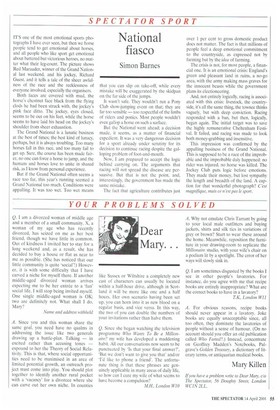National fiasco
Simon Barnes
IT'S one of the most emotional sports photographs I have ever seen, but then we horse people tend to get emotional about horses, and all people who like sport get emotional about battered but victorious heroes, no matter what their leg-count. The picture shows Red Marauder, winner of the Grand National last weekend, and his jockey, Richard Guest, and it tells a tale of the sheer awfulness of the race and the recklessness of everyone involved, especially the organisers.
Both faces are covered with mud, the horse's chestnut face black from the flying clods he had been struck with, the jockey's pink face ditto. The jockey, eyes closed, seems to be out on his feet, while the horse seems to have laid his head on the jockey's shoulder from sheer exhaustion.
The Grand National is a lunatic business at the best of times; the best kind of lunacy, perhaps, but it is always troubling, Too many horses fall in this race, and too many fail to get up. Sure, the course has been made fairer, no one can force a horse to jump, and the humans and horses love to unite in shared risk, as I know from personal experience.
But if the Grand National often seems a race too far, this year's running seemed a Grand National too much. Conditions were appalling. It was too wet. Too wet means that you can slip on take-off, while every mistake will be exaggerated by the skidpan on the far side of the jumps.
It wasn't safe. They wouldn't run a Pony Club show-jumping event on that; they are far too sensible — too respectful of the limbs of riders and ponies. Most people wouldn't even gallop a horse on such a surface, But the National went ahead; a decision made, it seems, as a matter of financial expedient. It was a very dangerous decision for a sport already under scrutiny for its decision to continue racing despite the galloping problem of foot-and-mouth.
Now, I am prepared to accept the logic behind carrying on. The arguments that racing will not spread the disease are persuasive. But that is not the point, and, interestingly, the government has made the same mistake.
The fact that agriculture contributes just over 1 per cent to gross domestic product does not matter. The fact is that millions of people feel a deep emotional commitment to the countryside, as expressed not by farming but by the idea of farming.
The crisis is not, for most people, a financial one. It is an emotional crisis: England's green and pleasant land in ruins, a no-go area, with the army making mass graves for the innocent beasts while the government plans its electioneering.
And. not entirely logically, racing is associated with this crisis: livestock, the countryside, it's all the same thing, the townee thinks vaguely, but with deep conviction. Racing responded with a ban, but then, logically, began again. The initial target was to save the highly remunerative Cheltenham Festival. It failed, and racing was made to look both money-grubbing and insensitive.
This impression was confirmed by the appalling business of the Grand National. This is supposed to be a race of the improbable and the improbable duly happened: no rider was injured, no horse was killed. The Jockey Club puts logic before emotions. They made their money, but lost sympathy the length and breadth of the land. A caption for that wonderful photograph? C'est magnifique, mais cc n'est pas le sport.


























































 Previous page
Previous page